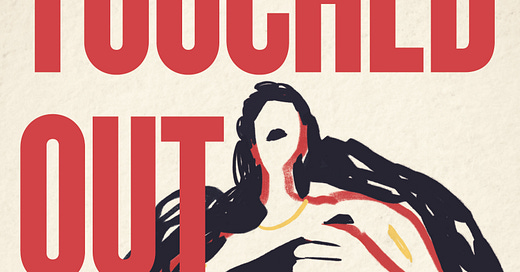Must a memoirist be an aspirational character?
Thoughts on the self-helpization of memoir
Phew! Wow. It’s been a week. There’s an excerpt of Touched Out at Elle Magazine (!) on how talking to my kids about consent taught me to value my own autonomy. I also wrote an essay for Time Magazine on why I hate the phrase “they’re only little once.” Oh, and Touched Out received a rave review in The Boston Globe!
It’s been an utter delight, as well, to do some interviews with
writers—a reminder of why I love this little corner of the internet, which has connected me with all of you, and also to so many fantastic thinkers.I spoke with the unparalleled expert on all things momfluencer culture
at her newsletter and her intro really did me in:I also spoke with my former student and friend
at her emerging newsletter :And
and I discussed how hookup culture primes women for the institution of motherhood. We’ll continue this conversion IRL this coming Tuesday, Sept 12 (pub day!) in San Francisco at Green Apple Books on the Park (the 9th street location). I would love to see some of you there. There will be CAKE.You can find the full book tour lineup below, and more info about registering for events and getting tickets here:
Touched Out Tour Dates!
So excited to share with you all the first round of tour dates for Touched Out! I cannot wait to talk with you all about this book. More information on all these events can be found here. Hope to see many of you out there! If you can’t make any of the events above, here are some other ways you can come out to support
Despite all this buzz, I’ve really been missing this space! I admitted to myself several weeks ago that I would not be able to keep up with all the random to-dos of a book launch and create new content for this column once, much less several times, a week. But writing is how I make sense of the world. And while at times I’ve felt resistant to the pressure to publish on a regular schedule that comes with a space like this, I’ve also found that returning here to all of you, to write through whatever is happening in the world, and in life, has been such a gift. It’s taught me how to a be a better writer, thinker, and person.
So here are some preliminary thoughts toward a longer piece I will write when things are not so hectic, on what I’m noticing as I start to talk with people about Touched Out. Not just because it applies to me or my book, but because I’m learning what’s expected of authors, and especially authors of memoir— and perhaps especially authors of what we so loosely call a “mom book.”
Nonfiction has changed so much in the past few decades. In recent years, we’ve also seen an explosion of “narrative nonfiction” books and reportage on motherhood, some of which draw somewhat on the history of not just memoir, but literary journalism. As I’ve alluded to in this space before, I’m skeptical of what this (not the mom book, but all these shifts in nonfiction) has done to the genre of memoir and autobiography.







